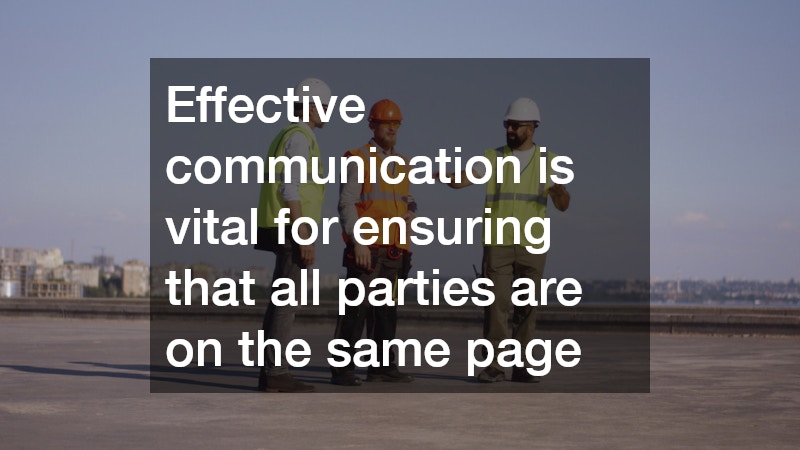Hiring general contractors can be a daunting task, but understanding the key traits to prioritize can simplify the process. Learn about the essential qualities to look for, enabling you to make a more informed decision.
Experience
Experience plays a crucial role in a contractor’s ability to manage a project effectively. When evaluating a contractor’s background, consider their years in the industry as well as the range of projects they’ve handled.
Specialized experience in certain types of construction or renovation work can provide a level of expertise that could be essential for your specific needs.
It’s not only about the duration of experience but also the relevance of that experience to your project. A contractor who has successfully managed projects similar to yours will likely be more adept at navigating the unique challenges that might arise. Ask potential contractors to share case studies or portfolios that demonstrate their capabilities.
Furthermore, consider how the contractor’s past experiences translate into successful project management. Look for solid project completion timelines, adherence to budgets, and customer satisfaction in their previous jobs. This historical data can be a strong indicator of their potential performance on your project.
Communication
Effective communication is vital for ensuring that all parties are on the same page throughout the project. Open and transparent communication can significantly reduce misunderstandings and misaligned expectations between you and the contractor. A contractor who actively listens and conveys information clearly can enhance the project experience.
Moreover, good communication skills can facilitate better coordination among subcontractors and suppliers involved in the project. A contractor who can communicate well with various stakeholders is likely to ensure that everyone is aware of timelines, responsibilities, and requirements, thereby minimizing delays.
In addition to verbal communication, consider how a contractor utilizes written communication. Detailed contracts, project updates, and documentation can serve as crucial tools for keeping everyone informed throughout the duration of your project. Effective communication revolves around both what is said and how it is documented.
Licensing
Licenses and insurance protect both the homeowner and the contractor. It’s essential to verify that the contractor holds the appropriate licenses for your locality, as this demonstrates their compliance with local laws and regulations. Check if the license is up-to-date and relevant to the type of work required for your project.
Insurance is just as critical, as it safeguards you from potential financial liabilities associated with accidents or damages that might occur during construction. Review the contractor’s insurance policies to ensure they include general liability and workers’ compensation, protecting you should any issues arise.
Taking the time to confirm licenses and insurance can shield you from hiring unqualified or unreliable contractors. Prioritize contractors who can provide documentation easily and clearly. A reputable contractor will be open about their qualifications and have everything in order to assure you of their credibility.
Reviews
The importance of checking references and online reviews cannot be overstated. When you ask prospective contractors for references, pay attention not only to the names but also to the projects they worked on together. Contact these references to get a firsthand account of their experience working with the contractor, focusing on aspects like reliability and quality of work.
Online reviews are an additional layer that can offer insights into a contractor’s reputation. Websites that specialize in contractor reviews can provide a broad spectrum of feedback, from glowing recommendations to critical assessments. Take the time to read both positive and negative reviews, as they form a well-rounded view of the contractor’s strengths and weaknesses.
While reviews and references can guide your decision, it is essential to interpret the information critically. Look for patterns in the feedback you receive; for example, if multiple references mention consistent delays or issues with communication, these may be red flags worth considering in your final decision.
Finances
Budgeting and understanding how to assess the financial stability of a contractor are fundamental to a successful hiring process. It’s important to obtain detailed estimates from contractors, which encompass all potential costs associated with your project. This transparency helps you plan your budget effectively and avoid unexpected expenses later on.
Additionally, evaluate the contractor’s financial stability by asking about their payment options and policies. A reputable contractor should be willing to provide insight into how they manage funds and payments for labor and materials. This can be a strong indicator of how they handle their business operations.
Do not hesitate to seek clarification on payment schedules, upfront costs, and any potential hidden fees. A clear understanding of financial obligations will help you forge a trusting relationship with the contractor, which is essential for the project’s success. Remember, clear financial communication can significantly influence the overall workflow and efficiency of your project.
By focusing on these essential traits when hiring a general contractor, you can choose a skilled and reliable professional who will help bring your project to fruition successfully. Take the time to evaluate each characteristic thoroughly. Your investment in narrowing down these traits will pay off, as you will be more equipped to make a choice that impacts your project’s outcome positively.




